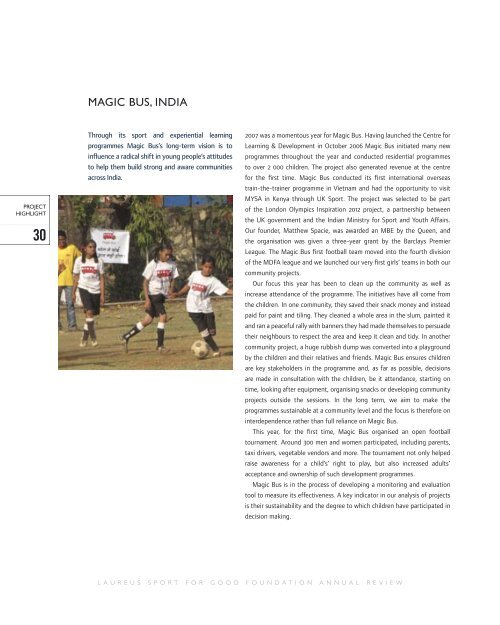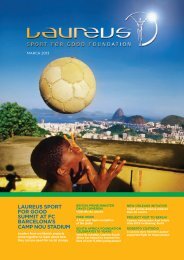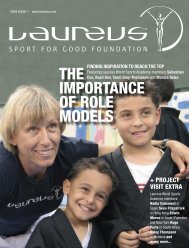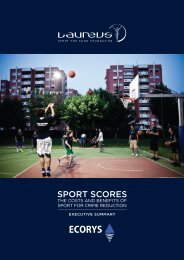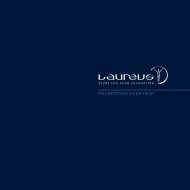Laureus Sport for Good Foundation
Laureus Sport for Good Foundation
Laureus Sport for Good Foundation
Create successful ePaper yourself
Turn your PDF publications into a flip-book with our unique Google optimized e-Paper software.
PROJECT<br />
HIGHLIGHT<br />
30<br />
MAGIC BUS, INDIA<br />
Through its sport and experiential learning<br />
programmes Magic Bus’s long-term vision is to<br />
infl uence a radical shift in young people’s attitudes<br />
to help them build strong and aware communities<br />
across India.<br />
2007 was a momentous year <strong>for</strong> Magic Bus. Having launched the Centre <strong>for</strong><br />
Learning & Development in October 2006 Magic Bus initiated many new<br />
programmes throughout the year and conducted residential programmes<br />
to over 2 000 children. The project also generated revenue at the centre<br />
<strong>for</strong> the fi rst time. Magic Bus conducted its fi rst international overseas<br />
train-the-trainer programme in Vietnam and had the opportunity to visit<br />
MYSA in Kenya through UK <strong>Sport</strong>. The project was selected to be part<br />
of the London Olympics Inspiration 2012 project, a partnership between<br />
the UK government and the Indian Ministry <strong>for</strong> <strong>Sport</strong> and Youth Affairs.<br />
Our founder, Matthew Spacie, was awarded an MBE by the Queen, and<br />
the organisation was given a three-year grant by the Barclays Premier<br />
League. The Magic Bus fi rst football team moved into the fourth division<br />
of the MDFA league and we launched our very fi rst girls’ teams in both our<br />
community projects.<br />
Our focus this year has been to clean up the community as well as<br />
increase attendance of the programme. The initiatives have all come from<br />
the children. In one community, they saved their snack money and instead<br />
paid <strong>for</strong> paint and tiling. They cleaned a whole area in the slum, painted it<br />
and ran a peaceful rally with banners they had made themselves to persuade<br />
their neighbours to respect the area and keep it clean and tidy. In another<br />
community project, a huge rubbish dump was converted into a playground<br />
by the children and their relatives and friends. Magic Bus ensures children<br />
are key stakeholders in the programme and, as far as possible, decisions<br />
are made in consultation with the children, be it attendance, starting on<br />
time, looking after equipment, organising snacks or developing community<br />
projects outside the sessions. In the long term, we aim to make the<br />
programmes sustainable at a community level and the focus is there<strong>for</strong>e on<br />
interdependence rather than full reliance on Magic Bus.<br />
This year, <strong>for</strong> the fi rst time, Magic Bus organised an open football<br />
tournament. Around 300 men and women participated, including parents,<br />
taxi drivers, vegetable vendors and more. The tournament not only helped<br />
raise awareness <strong>for</strong> a child’s’ right to play, but also increased adults’<br />
acceptance and ownership of such development programmes.<br />
Magic Bus is in the process of developing a monitoring and evaluation<br />
tool to measure its effectiveness. A key indicator in our analysis of projects<br />
is their sustainability and the degree to which children have participated in<br />
decision making.<br />
L A U R E U S S P O R T F O R G O O D F O U N D A T I O N A N N U A L R E V I E W


